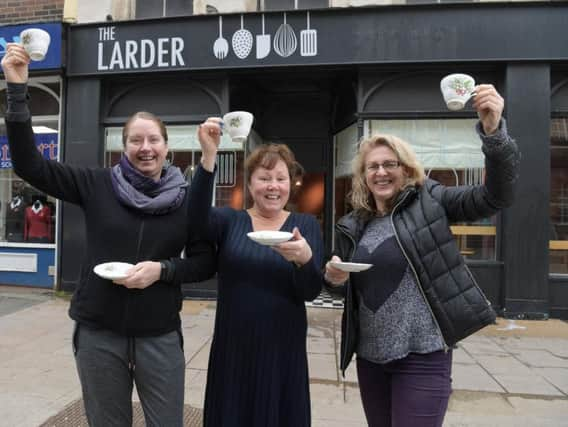‘Preston model’ hailed as a ‘beacon’ for cities


The so-called ‘Preston Model’ has been hailed as a ‘beacon’ for other cities by thinktank Centre for Local Economic Strategies (CLES).
The CLES says the model - which involves awarding key contracts to local firms where possible - has led to procurement worth £112m to Preston itself.
Advertisement
Hide AdAdvertisement
Hide AdToday, the Centre and Preston City Council have released a joint publication, telling the story of the ground-breaking Preston Model.


The impact of community wealth building has been significant, with dozens of localities following Preston’s lead.
The authors conclude: “Preston stands as a beacon and an inspiration for the important journey ahead.”
The so-called Preston Model – which has received praise from the current Labour party national leadership – outlines how anchor organisations procure services from local firms where possible, keeping funds within the county’s economy.
Advertisement
Hide AdAdvertisement
Hide AdThe most recent spend analysis found that the procurement from institutions rooted in Preston retained within the city was £112.3m - a rise of £74m from 2012/13.


Within the wider Lancashire economy (including Preston), £488.7m of spend had been retained, £200m up from the baseline analysis.
Since the project started, 4,000 extra employees in Preston are now receiving the Real Living Wage.
This includes the City Council itself, Lancashire County Council, the Office of the Police and Crime Commissioner for Lancashire, the Community Gateway housing association, Preston’s College, Cardinal Newman College and the University of Central Lancashire (UCLan).
Advertisement
Hide AdAdvertisement
Hide AdAmong projects which followed the model was the revamp of Preston’s covered market, led by family-run Conlon construction with local contractors.
Preston was also named ‘Most Improved City in the United Kingdom’ in ‘Good Growth for Cities 2018’.
Preston City Council leader Coun Matthew Brown said: “What we have been able to achieve to date through the “Preston Model” in and for our city has made a significant impact on the local economy. It would not have been possible to achieve what we have on this scale without our collaborative work with anchor institutions, partners and CLES.
“I am proud that we are able to tell the story of how we have implemented community wealth building in Preston and to demonstrate the journey we have taken over the last eight years.
Advertisement
Hide AdAdvertisement
Hide Ad“Our ultimate aim is to embed these principles further by building a richer and more democratic economy in Preston with further plans for a regional community bank and expanding the cooperative economy.”
Neil McInroy, chief executive of CLES, added: “This new publication tells the definitive story of the ‘Preston model’ of community wealth building. It celebrates successes that are the result of political leadership, vision and the work of many people.
“The deep and detailed work and collaboration between Preston City Council and CLES has been at the heart of that.
“Although CLES has been involved in community wealth building for 12 years, the success of Preston over the last eight of those years has triggered and accelerated a powerful community wealth building movement.
Advertisement
Hide AdAdvertisement
Hide Ad“Nevertheless, there is still much to do to build economic, social and climate justice and wealth for all. In that - and as this publication shows – Preston stands as a beacon and inspiration for the important journey ahead.” The report’s authors concluded: “ In eight years, Preston has shown that a different model of economic development is possible.”
The history of the Preston Model
The largest provider of social housing in Preston is one of the so-called “anchor institutions” at the heart of the city’s local approach to doing business.
Community Gateway Association (CGA) manages more than 6,000 homes in the area and its head of finance, Phil McCabe, says the company’s not-for-profit ethos has proved a perfect fit for the community wealth-building approach which Preston has been developing.
“It’s part of what we would want to do anyway, because creating local wealth clearly benefits the tenants who live in our properties,” he explained.
Advertisement
Hide AdAdvertisement
Hide AdThe social landlord brought its repair, refitting and grounds maintenance services in-house over five years ago, a move which the company claims gave it more control over where both its labour and its materials originate.
“There’s no guarantee of local employment if you contract services out and certainly no guarantee that local suppliers are used,” Mr McCabe said.
“We now make sure that we procure locally whenever we can, while still ensuring we get the best value for money.
“We’re working with the other anchor institutions to ensure local companies know how they can engage with us and what our needs are.”
Advertisement
Hide AdAdvertisement
Hide AdThose institutions are now planning to launch dedicated sections of their websites advising of the work which they are likely to have coming up over the course of the next 12-18 months.
“It will give local companies the chance to plan and put them in a stronger position to bid to supply us when opportunities do come up.
“Bringing these things back in-house has made a massive difference to the services we can provide - and because of how we operate, it gives us the opportunity to reinvest any profits which we make.”
CGA says that it can still press for local procurement even for those services - such as cleaning - which remain contracted to outside providers.
Advertisement
Hide AdAdvertisement
Hide AdThe company often considers the “social value” of any service which it buys in, examining a bidder’s intentions about where it will source its materials.
Such considerations can make up around five percent of the assessment which determines whether or not a contractor is successful in their bid for work with the housing provider.
Community Gateway
The origins of the Preston Model can be traced back to 2012.
A City Council representative attended a CLES event in London involving The Democracy Collaborative (TDC).
Advertisement
Hide AdAdvertisement
Hide AdTed Howard, TDC founder, then came to Preston to discuss community wealth building.
In 2012 Preston City Council becames the first local authority in the north of England to become accredited by the Living Wage Foundation as a Living Wage Employer.
The following year the City Council engaged CLES to collaborate to apply community wealth building principles in Preston.
The initial focus was on looking at the proportion of anchor institution spending that is local to Preston and Lancashire.
Advertisement
Hide AdAdvertisement
Hide AdFrom 2013, CLES and anchor institutions began to explore the £450m which is leaking out of local economy. The ‘Preston procurement practitioners group’ was developed to share findings.
In 2017, the City Council undertook further community wealth building work, including ideas for a community bank; developing the cooperative sector; and investing pensions in locally developed student housing.
Last year, Preston’s £3m market transformation was spearheaded by City-based contractors Conlon Construction in a shining example of local work being awarded locally.
The Larder
The Larder is a worker co-operative which promotes, provides and supplies local and sustainable food in Preston and neighbouring communities.
Advertisement
Hide AdAdvertisement
Hide AdSet up by founder Kay Johnson, the Preston-based organisation is exactly what Preston City Council wants to encourage.
The social enterprise promotes food that’s healthy, local, seasonal and waste-free. Profits go to communities in need.
The Larder has a catering business, a training academy and a network of Lancashire farms.
Now it has a cafe on Lancaster Road, creating six new jobs.
Founder Kay Johnson started The Larder in her free time five years ago. She said: “We support everything that Matthew Brown and the council are trying to do.
The work we do at The Larder we share with the community.”